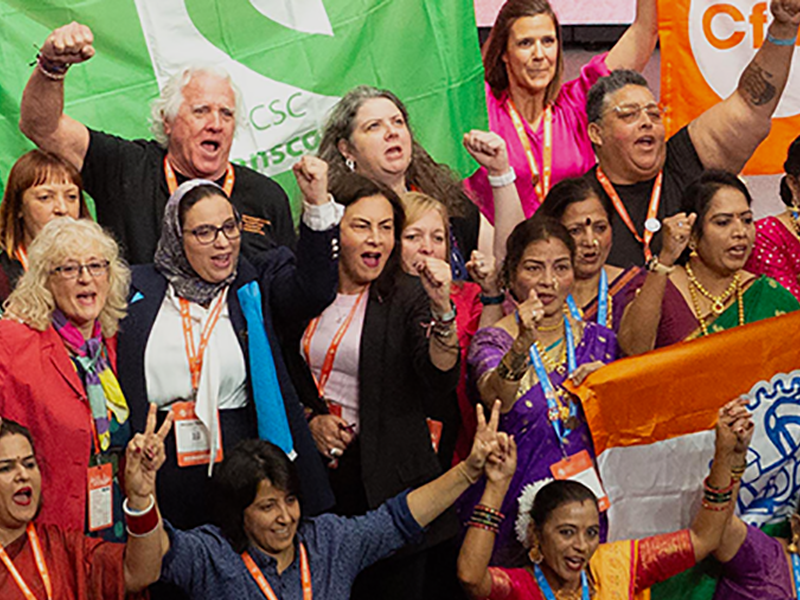The MSC label’s ‘blue tick’ does not represent an ethical consumer choice when fishers suffer severe labour rights abuses, open letter reveals.
Marine Stewardship Council (MSC) certification is enabling companies to conceal labour abuses in their supply chains, says the Seafood Working Group, a coalition of trade union, human rights, and environmental organisations. In an open letter, published today, the Seafood Working Group urges the MSC to admit to and address serious failings in its certification process.
The MSC label is often marketed as the ”gold standard” for sustainable seafood and is used by many companies to improve market access for their seafood products – and by many consumers as a perceived guarantee of ethical production standards. According to the MSC, it 'condemns forced labour’ and, although billed as an environmental standard, it has ‘taken steps to keeping forced labour out of the MSC certified supply chain'.
However, the reality is that UK supermarkets—and the MSC itself—could be profiting from modern slavery while marketing their products under the banner of sustainability.
“Consumers across the world are being fooled into buying seafood with a ‘blue tick’ because they believe that it’s an ethical choice – but there’s nothing ethical about ‘sustainable’ seafood caught off the back of forced labour,” said Chris Williams, Fisheries Section Coordinator for the International Transport Workers’ Federation (ITF).
Recent investigations into MSC-certified fisheries reveal appalling labour rights abuses are taking place while companies continue to receive a ‘blue tick’ for ethical standards. Forced labour and workplace accidents are occurring and not being investigated.
Abuses in tuna fisheries are a particular concern. Although the MSC, which certifies nearly 60% of the world’s tuna, insists it is protecting workers across the supply chain, new data show that most tuna vessel owners within the programme are participating anonymously. Vessel conditions are untraceable for 74% of the tuna catches reported by certifiers, undermining the claim of keeping forced labour out.
The Seafood Working Group says the MSC’s reliance on unverified self-reports and fishery-level audits have allowed companies to mask severe labour abuses. The organisation’s objective is to expand the number of certified fisheries globally and increase the revenue from using the MSC label.
“It’s truly shocking that such a well-known label, touted as the world’s gold standard for seafood, actually ignores labour abuses in its certified fisheries. It shows a blatant disregard for consumers who won’t have any idea of this,” said Williams.
“To fix this mess, the MSC needs to come clean and admit that its label doesn’t offer any guarantee whatsoever of rights protection. Better still, it can be part of the solution by actively promoting and endorsing legally binding, trade union Collective Bargaining Agreements.”
According to the International Labour Organization (ILO) at least 128,000 fishers are subjected to forced labour, and over 100,000 lose their lives annually due to hazardous working conditions.
Key Demands from the Seafood Working Group:
- Transparency: Publicly acknowledge that MSC certification does not guarantee labour rights protections and clarify that the label should not be interpreted as a safeguard against forced labour.
- Due Diligence: Warn companies that relying solely on MSC certification is insufficient for ensuring ethical labour practices, urging the integration of comprehensive Human Rights Due Diligence (HRDD) processes that include trade unions and workers.
- Binding Protections: Endorse legally binding agreements, such as Collective Bargaining Agreements and Enforceable Brand Agreements with independent, democratic trade unions, to ensure fishers receive fair wages, safe working conditions and effective remedies for violations.
Notes
The Seafood Working Group (SWG) is a global coalition of human rights, labour and environmental organisations that work together to develop and advocate for effective government policies and industry actions to end the related problems of labour exploitation, illegal fishing and overfishing in the international seafood trade. Founded in 2014 together with the support of Humanity United, the SWG is convened by Global Labor Justice - International Labor Rights Forum (GLJ-ILRF) and is led by an Advisory Body of leading organizations in these fields.



